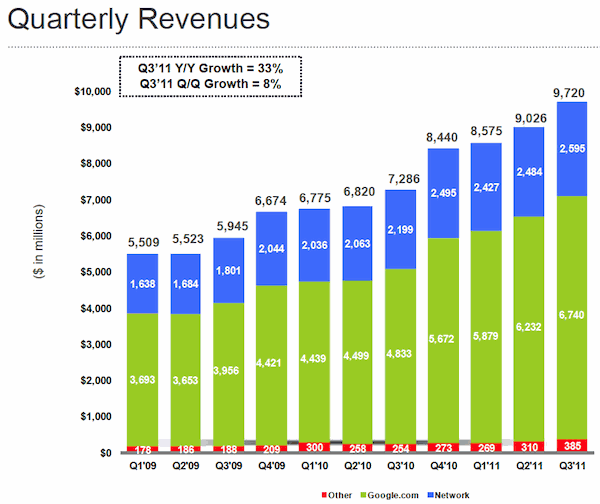It was an interesting quarter for Google. The search giant moved into uncharted territory with the launch of Google Plus, bringing its data-driven business squarely into the social realm. The branding of “Google+” is hard to ignore; how do you read that? It’s “Google,” but it’s more. But to make the social network a + instead of a -, Google has to tie it into its core business – advertising targeted to searches – and use the social data to improve it.

Google can’t do that without its mobile vehicle, Android, the most popular smartphone OS in the world. Mobile computing is becoming the most important kind. Its use surpassed desktop computing this year, and mobile ad revenue is exploding. Location-powered search is the key to the business, and Apple – Google’s mobile competitor – is revving its engines in that space. Google Plus, the big Q3 experiment, is tailor-made for Android use. So where is Google’s mobile vision in its Q3 earnings results announced yesterday? Good question. It isn’t there.
No Mention Of Mobile
Did Google forget that it bought Motorola Mobility for $12.5 billion in August? Doubtful. That’s a lot of money, though, and it’s Google’s first adventure in the handset-making business. Google can’t comment on the specifics of the deal until it closes, but shouldn’t Google have given its investors some clues about its handset intentions? Well, it didn’t. Not in the quarterly report.
Yesterday, @Android joined Twitter, Ice Cream Sandwich avatar and all. I guess he (it?) had nothing better to do, since he wasn’t invited to the earnings call going on at the same time.

Numbers And Silence
Google’s overall revenue grew by 33% year over year. But its quarterly report lumps mobile revenues in with the rest. On the live call, CEO Larry Page said he expects Google to earn $2.5 billion in mobile ad sales this year, but that’s just an expectation. Actual, measurable quarterly mobile performance was not something Google deigned to report.
Let’s compare this year over year. The Q3 2010 earnings report mentions mobile channels seven times and names Android three times. Yesterday’s Q3 report mentions neither at all.
Mobile Is A Channel
Google makes mobile apps, but mobile isn’t really a Google “product.” The Android licensing business is about getting onto as many phones as possible. Google’s even willing to pay heavy taxes to its competitors to license all the patents involved. Google gets a little defensive about that sometimes. Patents are an obstacle to getting Android everywhere.
Google treats mobile as a channel – a very important one. It’s not just about Android; that’s just one of many vehicles in Google’s overall mobile ad business. Google incentivizes mobile heavily. It even gives away mobile sites for free to businesses.
Google needs small, local businesses on board. That’s where the meat is. Local, mobile, location-powered search – and hence advertising – is the best cookie in the jar. And Google is making moves in that space that seem almost panicked, seizing control of the content of business listings, buying up all kinds of local-focused companies, and even trying to make cash registers dependent on Android phones.
Siri: No Mere Android
Why so serious, Google? You’re the king of search, and your general financial situation seems quite comfortable. What’s the problem?
Well, here’s one: the iPhone is already the most popular smartphone handset in the world, and Apple just released a version with an artificial intelligence that performs searches for its users. In one of Apple’s first deals for Siri, it uses Yelp, Google’s competitor, for local business searches. And that’s just on the high end; on the same day, Apple started giving away the iPhone 3GS for free.
Google’s Big Wait
Google is spending and scaling aggressively; expenditures were up 34% over Q3 2010. The majority of that spending was on IT infrastructure investments, but Google is also investing heavily in people. Its workforce topped 30,000 people this quarter, adding over 2,500 full-time employees. It also bought a phone company.
In general terms, Google did very well in Q3. It made a great deal of money. But it’s also reinvesting tons of it in machines, humans, and phone manufacturers. Google is working hard; so hard that its new experiment, Google Plus, is rolling out at a painstakingly slow pace. Where’s the rest of the API? Where are the distinguishing features?
How many things can Google do at once?




















